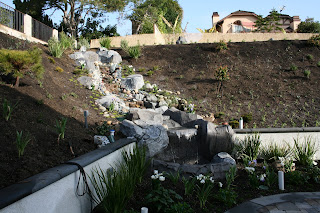We arrived in Osaka, Japan on August 1, 1998. Before long,
we began to meet some of the Americans already there. (We were the first of the
USJ team to settle there, but other expats were in the area already.) Among the
first were members of the US Consulate, including Paul Yeskoo. We were pleased
to find they attended the same church we went to. (There was on only one
English-speaking Christian church in the area.)
Paul and his wife, Lindsey, had three children: son, Chris,
daughter, Emily, and baby Madeleine. Emily, the middle child, was cute, and bright,
so sweet.
We were there with them for over two years, and we got to
know all of them. My favorite memory of Emily at the time was a weekend in
October of 2000 when the entire church decamped to Camp Sengari, a Japanese onsen
or hot springs. Larry took his movie camera, and we have film of all the kids
running by our cabin laughing together. There is film of everyone eating,
playing games, and worshiping. And Emily is in most of them.
A couple of months before we left, the Yeskoos returned to
Washington for cultural and language classes before being sent to Shanghai, China.
We returned home shortly thereafter.
About two years later, we heard some disturbing news. Emily
was exhibiting some strange behavior. In December of 2002, nine-year-old Emily
began to lose mobility. The doctors in China were at a loss to figure out what
was happening. So, in March 2003, Emily and Lindsey were medically evacuated back
to North America. Emily, now ten-years-old, underwent extensive testing.
The chief pediatric neurologist sadly relayed her diagnosis. Emily
was suffering from a rare, fatal disease called MLD, which had in two years
almost destroyed the white matter in her brain. No known treatment. No
known cure. She was given a prognosis of no more than three
years.
Since Emily’s condition was caused by a recessive gene, her
siblings were also tested. Fortunately, they did not have the disease.
The family moved to Toronto, Canada, where Paul was
assigned.
Soon, Emily stopped walking, talking, eating. She could do nothing
for herself. She remained bedridden and under palliative care. Fortunately, she
was able to be at home with Lindsey as her primary caregiver. Despite her
limitations, Emily remained aware and responsive.
She came very close to death at least five times. Yet, each
time she miraculously recovered. Occasionally, she was able to sit upright in a
wheelchair.
Her siblings grew up and moved away. Chris married and is
living in Colorado. Madeleine attends college. Through the years, Paul has
moved to several posts overseas because of his job. Lindsey and Emily remained
in Toronto.
In March of this year, she turned twenty-six—far exceeding
all expectations. During the past couple of years, she began art therapy. Her
paintings are fabulous. (I hope to work with Lindsey to publish Emily’s art in
a book.)
Emily inspired so many people that Emily’s House, the first hospice
for children in the world, located in Toronto, was named for her.
https://www.emilyshouse.ca/
Last year, Lindsey was awarded the Heroes in the Home Caregiver
Recognition Award, from the Central Community Care Access Centre (CCAC).
On Wednesday, I opened Facebook to this post from Lindsey.
The sun rose golden on her
still-warm body this morning...but her spirit had been finally set free,
released directly from the warmth from my arms to those of the Greatest Eternal
CareGiver that ever was. My precious Emily. A beautiful life. A beautiful death,
if one can even say that. Our hearts are absolutely broken. But tucked in there
is also the immense privilege of having known and loved her and had her as our
own (yet not)...and being forever transformed. There is so much more to say.
Now is our time of weeping...and her time of leaping…The family is all
gathering from various corners of the earth, with the request that our privacy
be respected over these coming days. Details will eventually emerge.
I, too, am heartbroken. At the same, I feel so blessed to
have had these precious people in my life.





























